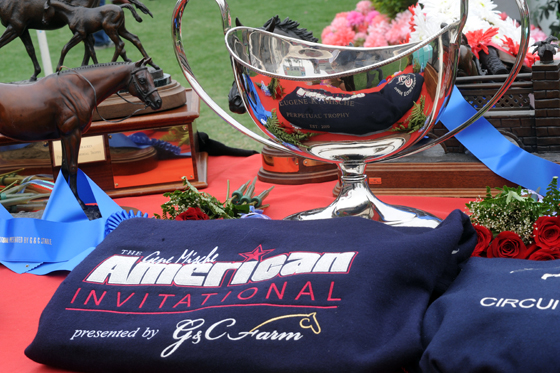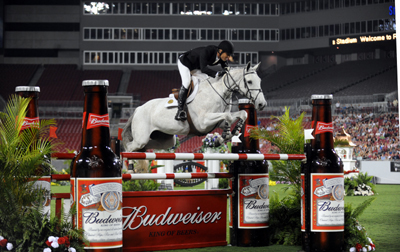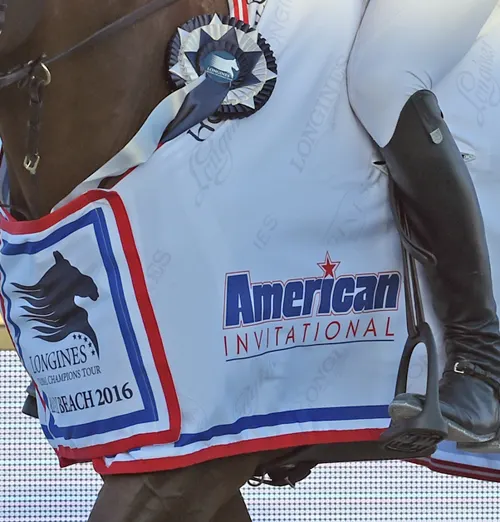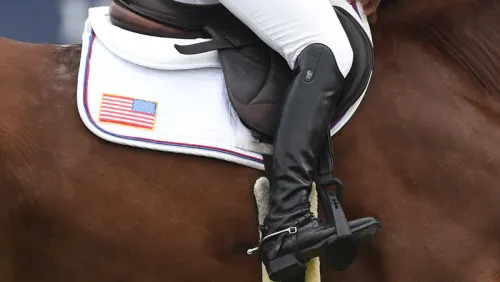Just before I headed to Miami Beach, Fla., to cover the Longines Global Champions Tour there, I wrote a quick Throwback Thursday story about Chris Kappler winning the $100,000 Budweiser American Invitational in 1995. Having just written that story made the glaring gap between the Invitational that was and the Invitational that now exists all the more obvious after I watched this year’s Invitational.
There is still a class called “the American Invitational,” but in 2015 and 2016, it has been part of the schedule of the Longines Global Champions Tour of Miami Beach. And it has been about as far from what the American Invitational used to be as it could be. I think it’s time to stop calling the LGCT class the American Invitational—doing so does a disservice to the history of the class.

Don’t get me wrong—the Miami LGCT is an amazing venue and a spectacular class. It’s generated a lot of excitement, and it’s brought some of the world’s best riders to U.S. soil.
But incorporating the American Invitational into its schedule as a second-tier, 1.50-/1.55-meter grand prix has tarnished the history of the class, in my opinion. This year, out of 49 starters, there were 11 American riders—less than a quarter of the class. And in 2015, an English rider won (Scott Brash) and this year, a German (Daniel Deusser).
In 2015, the LGCT officials included some fanfare for the Invitational, but this year there wasn’t even a press conference for the class.
I was lucky enough to have covered the American Invitational for a number of years in the Tampa Stadium, where the class was hosted for 41 years. It was an event truly unlike any other—the only show jumping event in the United States held in an NFL football stadium.
The public walking the course for the American Invitational in Tampa Stadium.
There was a definite frisson of excitement that went along with seeing horses walk out onto that huge field, and while the stands in that enormous stadium weren’t full, there were dedicated and excited fans in the seats. As you walked in from the parking lot, you could get up close and personal with the horses as they hung out in their tent stalls set up just for the evening and schooled in a warm-up arena in the parking lot, where fans could hang over the fence and watch. With the night setting under the lights, in an enormous stadium, the Invitational was in a class of its own.
Legendary horses’ and riders’ names are etched on the American Invitational trophy—Rodney Jenkins and Idle Dice, McLain Ward and Sapphire, Beezie Madden and Authentic, Greg Best and Gem Twist, Melanie Smith and Calypso, Ian Millar and Big Ben, Robert Ridland and Southside, among so many more. The Invitational was the highlight of the spring season, the class every rider wanted to win.

Chris Kappler winning the 2009 $200,000 Budweiser American Invitational aboard VDL Oranta. Photo by Molly Sorge
The field was usually predominantly U.S riders—in fact, before 2015 only three non-U.S. riders had ever won it (Tim Grubb of England in 1986, Ian Millar in 1992 and Brazilian Rodrigo Pessoa in 2006). This was because riders had to qualify for the class by virtue of their winnings during the Winter Equestrian Festival in Wellington and Tampa, Fla. The field was traditionally the top 30 riders from WEF. Prize money was—by the standards of the time—remarkable at six figures.
But since the mid 2000s, the Invitational has struggled. It lost Budweiser as a title sponsor in 2009. And Wellington Equestrian Partners bought WEF in 2007, so the traditional qualifying process for the Invitational was lost. Michael Morrissey of Stadium Jumping made a massive effort to keep the class going in Tampa, but diminished sponsor dollars and spectator attendance made it financially impossible. In 2014, the class was held at the SunLife Stadium in Miami, then in 2015 it joined the Global Champions Tour event.
What’s better, an American Invitational with no resemblance to the original class? Or no American Invitational at all? As someone who enjoyed some of my most awe-inspiring nights of show jumping in Tampa, I am very sad to see this latest evolution in its history.
A list of former American Invitational winners…
1973 $15,000 American Invitational
Rodney Jenkins & Idle Dice
1974 $15,000 American Invitational
Michelle McEvoy & Sundance
1975 $15,000 American Invitational
Michelle McEvoy & Sundance
1976 $15,000 American Invitational
Robert Ridland & Southside
1977 $15,000 American Invitational
Terry Rudd & Mr. Demeanor
ADVERTISEMENT
1978 $25,000 American Invitational
Norman Dello Joio & Allegro
1979 $30,000 Anheuser-Busch American Invitational
Rodney Jenkins & Third Man
1980 $35,000 Anheuser-Busch American Invitational
Bernie Traurig & Eaden Vale
1981 $50,000 Anheuser-Busch American Invitational
Buddy Brown & Felton
1982 $50,000 Anheuser-Busch American Invitational
Melanie Smith & Calypso
1983 $50,000 Anheuser-Busch American Invitational
Katie Monahan & Noren
1984 $100,000 Anheuser-Busch American Invitational
Leslie Burr & Albany
1985 $100,000 Michelob American Invitational
Katie Monahan & The Governor
1986 $100,000 Michelob American Invitational
Tim Grubb & Linky
1987 $100,000 Michelob American Invitational
Lisa Jacquin & For The Moment
1988 $100,000 Michelob American Invitational
Katie Monahan-Prudent & Special Envoy
1989 $100,000 Michelob American Invitational
Greg Best & Gem Twist
1990 $100,000 Michelob American Invitational
David Raposa & Seven Wonder
1991 $100,000 Michelob American Invitational
George Lindemann & Three’s & Seven’s
1992 $100,000 Budweiser American Invitational
Ian Millar & Big Ben
1993 $100,000 Budweiser American Invitational
Debbie Stephens & Volan
1994 $100,000 Budweiser American Invitational
Michael Matz & Rhum IV
1995 $100,000 Budweiser American Invitational
Chris Kappler & Seven Wonder
1996 $100,000 Budweiser American Invitational
Harold Chopping & Brandy
1997 $100,000 Budweiser American Invitational
Todd Minikus & Ravel
ADVERTISEMENT
1998 $100,000 Budweiser American Invitational
McLain Ward & Twist Du Valon
1999 $150,000 Budweiser American Invitational
Marley Goodman & Canyon *
2000 $150,000 Budweiser American Invitational
Schuyler Riley & Ilian
2001 $200,000 Budweiser American Invitational
Molly Ashe & Kroon Gravin
2002 $200,000 Budweiser American Invitational
Molly Ashe & Kroon Gravin
2003 $200,000 Budweiser American Invitational
Chris Kappler & Royal Kaliber
2004 $200,000 Budweiser American Invitational
Norman Dello Joio & Glasgow
2005 $200,000 Budweiser American Invitational
Beezie Madden & Authentic
2006 $200,000 Budweiser American Invitational
Rodrigo Pessoa & Baloubet De Rouet
2007 $200,000 Budweiser American Invitational
Beezie Madden & Authentic
2008 $200,000 Budweiser American Invitational
McLain Ward & Sapphire
2009 $200,000 Budweiser American Invitational
Chris Kappler & VDL Oranta
2010 $200,000 Gene Mische American Invitational
Jeffery Welles & Armani
2011 $200,000 Gene Mische American Invitational
Kent Farrington & Uceko
2012 $200,000 Gene Mische American Invitational
Mario Deslauriers & Cella
2013 $200,000 Gene Mische American Invitational
McLain Ward & Rothchild
2014 $200,000 American Invitational (in Miami SunLife Stadium)
Beezie Madden & Coral Reef Via Volo
2015 $127,200 American Invitational (as part of Longines Global Champions Tour of Miami Beach)
Scott Brash & Hello Forever
2016 $130,000 American Invitational (as part of Longines Global Champions Tour of Miami Beach)
Daniel Deusser & Clintop 2















